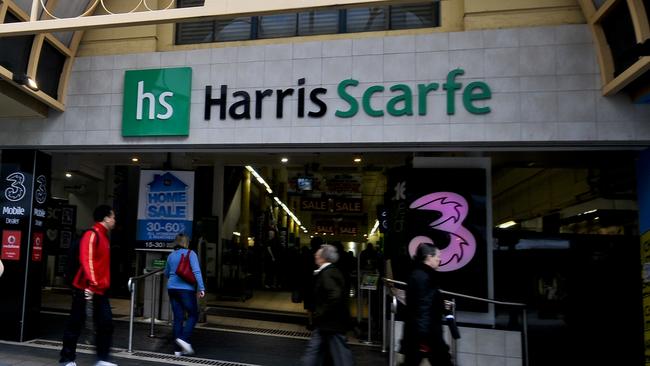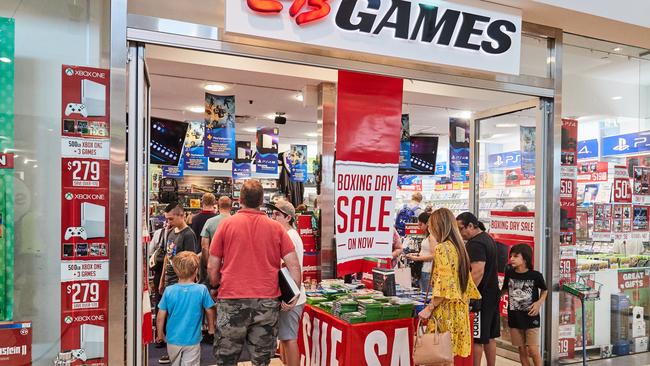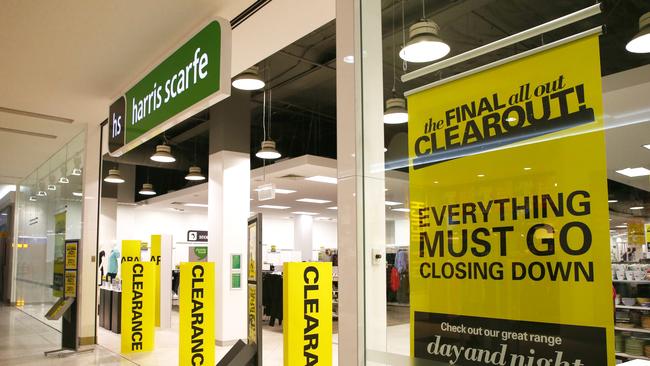Iconic Aussie brand Harris Scarfe saved from collapse after finding a buyer
Three months after going into receivership, embattled retailer Harris Scarfe has found a buyer to take over the chain’s 44 stores.

Retail
Don't miss out on the headlines from Retail. Followed categories will be added to My News.
Three months after announcing it was being placed in receivership, embattled retailer Harris Scarfe has found a buyer to take over the chain.
The news will come as a relief to the 1300 Harris Scarfe employees who were at risk of losing their jobs after the chain announced store closures earlier this year.
The administrators from Deloitte short-listed four potential buyers for the chain but announced today that the Spotlight Group has been granted exclusivity to buy the business.
It said Spotlight was a “highly experienced Australasian retailer with a large property portfolio ideally suited to enabling future growth for Harris Scarfe employees and all stakeholders”.
Twenty-one stores across Australia were closed by the administrators after the company went into receivership in December but forty-four stores remained open.
Now the administrators have said they would work with Spotlight to keep the remaining Harris Scarfe staff members employed.

Administrator Vaughan Strawbridge said there was still work to do “to finalise the transaction and we will be working with the Spotlight Group and the Harris Scarfe leadership team to make this happen”.
The Spotlight Group is owned by rich-listers Zac Fried and Morry Fraid and operates fabric chain Spotlight and adventure store Anaconda.
The transaction is not locked in and will require further work but could be completed by as early as mid-April.
“We are hopeful all of the 44 stores will be retained under the sale, but ultimately this will be dependent on how the transaction progresses over the next couple of weeks,” Mr Strawbridge said.
Harris Scarfe was the first in a long line of retail collapses throughout the festive season.
It is only one of two to find a buyer, as Jeanswest confirmed a buyer for its stores earlier this year.
KPMG revealed that Harbour Guidance had stepped in to save the iconic Aussie jeans company and 680 jobs.
RETAIL WOES
Harris Scarfe’s troubles were first revealed on January 7.
Just days later, McWilliam’s Wines – the country’s sixth-largest wine company that has been run by the same family for more than 140 years – announced it had also appointed voluntary administrators.
Then it was popular video game chain EB Games’ turn, with the business confirming it was closing at least 19 stores across the country within weeks, while fashion chain Bardot is also planning to shutter 58 stores across the nation by March.

In January it also emerged Curious Planet – the educational retailer previously known as Australian Geographic, which is owned by parent company Co-op Bookshop – would pull 63 stores across Australia after failing to find a buyer for the brand, while denim chain Jeanswest entered voluntary administration that month and tech giant Bose also revealed it would close all Australian stores and 119 across the globe largely as a result of the rise of online shopping.
This year German supermarket Kaufland also pulled out of the Australian market after investing millions into the expansion before making a hasty exit to focus on its European offerings.
And handbags and accessories chain Colette by Colette Hayman was also placed into voluntary administration in late January, leaving 300 jobs and 140 stores in the lurch, while furniture, homewares and handicrafts store Ishka also collapsed in February.
The dismal first fortnight of the year for retail follows a horror 2019 that brought the collapse of a slew of Aussie businesses, with some international players also folding.
Last January, menswear retailer Ed Harry went into voluntary administration, and a week later, Aussie sportswear favourite Skins also revealed it was on the brink of failure after applying for bankruptcy in a Swiss court.
At the end of the month, the Napoleon Perdis beauty empire appointed administrators, although it was saved from liquidation by KUBA Investments three months later.
Footwear trailblazer Shoes of Prey also met its demise in March last year along with British fashion giant Karen Millen, which in September revealed it would soon shut all Aussie stores, leaving around 80 jobs in peril.

In October, celebrity chef Shannon Bennett’s Melbourne burger chain Benny Burger was also placed into administration, followed by seven Red Rooster outlets in Queensland just days later and then Aussie activewear sensation Stylerunner, which has since been sold to Accent Group Limited.
In November, it was revealed that popular furniture and homewares company Zanui was in trouble after it abruptly entered voluntary administration, leaving angry customers in the lurch.
Later that month, Muscle Coach, a leading fitness company, was put into voluntary administration after a director received a devastating diagnosis and the company racked up debts of almost $1 million.
Then it was the famous Criniti’s restaurant chain’s turn to enter into voluntary administration, with several of the 13 sites across the country set to close for good. It was closely followed by discount legend Dimmeys.
Leading Australian fashion designer Alex Perry closed his only bricks-and-mortar store in Sydney’s Strand Arcade in February, announcing he will focus solely on online.
Originally published as Iconic Aussie brand Harris Scarfe saved from collapse after finding a buyer


